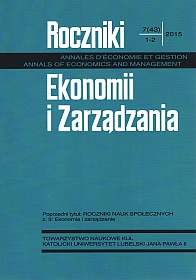Reakcje konsumentów na ogłoszenia CSR
Abstrakt
Przedsiębiorstwa angażujące się w działalność CSR zazwyczaj informują o tym opinię publiczną, nie zawsze zdając sobie sprawę ze skutków takiego powiadamiania. Jako test wiarygodności może tu służyć niezależne źródło informacji. Zbyt intensywne i nachalne powiadamianie o wątpliwych inicjatywach CSR może być odczytywane jako hipokryzja. Jak wskazują wyniki badań własnych, negatywną reakcję na ogłoszenia CSR można zauważyć przede wszystkim w grupie osób o nastawieniu konserwatywnym.
Bibliografia
Arvidsson S.: Communication of Corporate Social Responsibility: A study of the Views of Management Teams in Large Companies, “Journal of Business Ethics” 96(2010), pp. 339-354.
Benoit-Moreau F., Parguel B.: Building brand equity with environmental communication: an empirical investigation in France, “EuroMed Journal of Business” 6(2011), No. 1, pp. 100-116.
Carroll A.B.: Corporate Social Responsibility: Evolution of Definitional Construct, “Business & Society” 38(1999), No. 3, pp. 268-295.
Chen H., Zhang H.: Two-way communication strategy on CSR information in China, “Social Responsibility Journal” 5(2009), No. 4, pp. 2009.
Davis D., MacDonald J.B.: Improving the Promotion of CSR Initiatives: A Framework for Understanding Stakeholder Communications from a Dynamic Learning Perspective, “Academy of Marketing Studies Journal” 15(2010), No. 2, pp. 77-93.
Farache F., Perks K.J.: CSR advertisements: a legitimacy tool?, “Corporate Communications: An International Journal” 15(2010), No. 3, pp. 235-248.
Fassin Y., Buelens M.: The hypocrisy-sincerity continuum in corporate communication and decision making. A model of corporate social responsibility and business ethics practices, “Management Decision” 49(2011), No. 4, pp. 586-600.
Groza M.D., Pronschinske M.R., Walker M.: Perceived Organizational Motives and Consumer Responses to Proactive and reactive CSR, “Journal of Business Ethics” 102(2011), pp. 639-652.
Matten D., Moon J.: ‘Implicit’ and ‘Explicit’ CSR: A conceptual framework for a comparative understanding of corporate social responsibility, “Academy of Management Review” 23(2008), issue 1, pp. 27-33.
Nielsen A.E., Thomsen Ch.: CSR communication in small and medium-sized enterprises. A study of the attitudes and beliefs of middle managers, “Corporate Communications: An International Journal” 14(2009), No. 2, pp. 176-189.
Parguel B., Benoit-Moreau F., Larceneux F.: How Sustainablility Ratings Might Deter ‘Greenwashing’: A Closer Look at Ethical Corporate Communication, “Journal of Business Ethics” 102(2011), pp. 15-28.
Pawlak M., Liu Sh.-Ch., Dimitrova V.: MANAGEMENT STUDENTS’ VALUES AND OPINIONS ABOUT CSR, “Proceedings of the Southwest Decision Sciences Forty-Fifth Annual Meeting” 2014, March 11-March 15 [Dallas, Texas].
Quairel-Lanoizelée F.: Are competition and corporate social responsibility compatible? The myth of sustainable competitive advantage, “Society and Business Review” 6(2011), No. 1, pp. 77-98.
Schwartz Sh.H.: Studying Values: Personal Adventure, Future Directions, “Journal of Cross-Cultural Psychology” 42(2011), No. 2, pp 307-319.
Swaen V., Vanhamme J.: The Use of Corporate Social Responsibility Arguments in Communication Campaigns: Does Source Credibility Matter?, “Advances in Consumer Research” 32(2005), pp. 590-591.
Wang L., Juslin H.: Values and Corporate Social Responsibility Perceptions of Chinese University Students, “Journal of Academic Ethics” 10(2012), issue 1, pp. 57-82.
Copyright (c) 2015 Roczniki Ekonomii i Zarządzania

Utwór dostępny jest na licencji Creative Commons Uznanie autorstwa – Użycie niekomercyjne – Bez utworów zależnych 4.0 Międzynarodowe.


